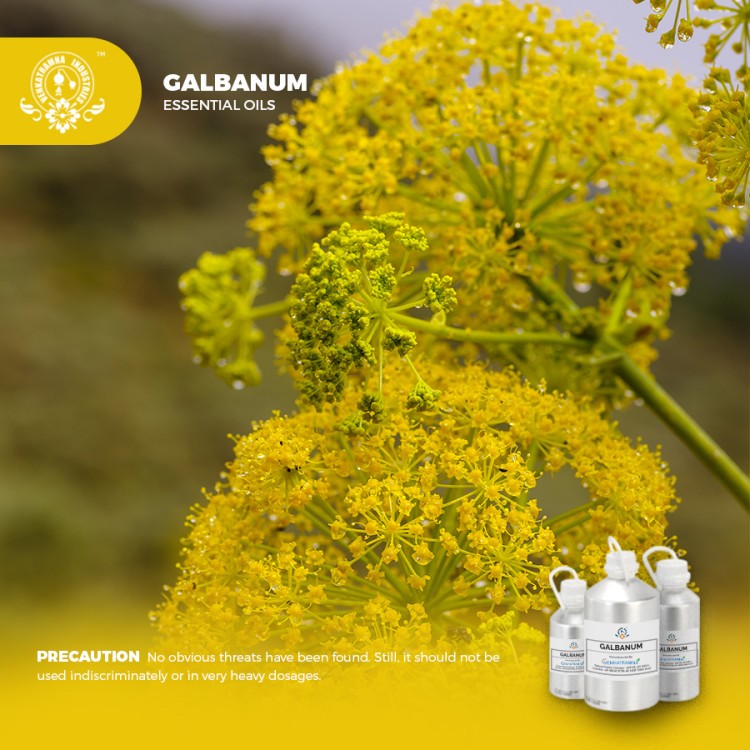
Galbanum essential oil, extracted from the resin of the Ferula galbaniflua plant, has been used for thousands of years in traditional healing and spiritual practices. Known for its earthy, woody, and slightly balsamic aroma, this powerful oil has a rich history dating back to ancient Egypt, where it was used in incense, perfumery, and medicinal preparations. In this article, we explore the properties, uses, and benefits of galbanum essential oil, revealing why it remains a treasured natural remedy in today's wellness landscape.
1. What is Galbanum Essential Oil?
Historical Significance: Galbanum oil has been highly valued throughout history for its medicinal and spiritual properties. It was often used in ancient rituals, including mummification in Egypt, and was referenced in the Bible as a component of sacred incense. Today, galbanum oil is still prized for its grounding and healing qualities, making it a versatile oil for modern aromatherapy, skincare, and holistic wellness practices.
Extraction Process: Galbanum essential oil is obtained through steam distillation of the gum resin collected from the galbanum plant, a member of the Apiaceae family. The resin is carefully extracted from the plant’s roots or stems, and then distilled to produce the oil. This method ensures the preservation of the therapeutic properties of the resin while delivering a potent and aromatic oil.
2. Aroma Profile and Chemical Composition
Scent Characteristics: Galbanum oil is known for its unique aroma—earthy, green, and resinous with a sharp, spicy undertone. Its distinctive scent evokes a sense of the natural world, grounding and centering the mind. The oil blends well with a variety of other essential oils, including frankincense, lavender, sandalwood, and citrus oils, adding depth and complexity to fragrance formulations.
Key Constituents: The therapeutic properties of galbanum oil are attributed to its chemical composition, which includes compounds such as β-pinene, α-pinene, and limonene. These constituents give the oil its anti-inflammatory, antiseptic, and analgesic properties, making it highly beneficial for a range of health and wellness applications.
3. Health Benefits of Galbanum Essential Oil
Anti-inflammatory and Pain Relief: One of the most common uses of galbanum oil is for its anti-inflammatory and pain-relieving properties. When applied topically (diluted in a carrier oil), galbanum oil can help reduce joint and muscle pain, making it an excellent choice for those suffering from arthritis or sports injuries. Its natural analgesic qualities also make it effective for treating headaches and migraines.
Wound Healing and Skin Care: Galbanum oil has strong antiseptic properties, making it an ideal solution for treating cuts, wounds, and skin infections. It can help prevent infections from developing and promote faster healing. Additionally, its regenerative properties make it beneficial for reducing the appearance of scars, wrinkles, and other signs of aging. Incorporating galbanum oil into your skincare routine can lead to healthier, more radiant skin.
Respiratory Health: The expectorant properties of galbanum oil make it an excellent remedy for respiratory issues such as congestion, colds, and coughs. Inhaling the vapor of galbanum oil through a diffuser or steam inhalation can help clear the airways, reduce inflammation, and improve breathing.
Emotional and Mental Wellness: Galbanum essential oil has a grounding effect on the mind, making it a popular choice for meditation and relaxation. Its calming aroma helps reduce stress, anxiety, and tension, while promoting a sense of balance and clarity. Using galbanum oil in aromatherapy can enhance emotional well-being, relieve mental fatigue, and restore focus.
4. Applications of Galbanum Essential Oil
Aromatherapy: In aromatherapy, galbanum oil is revered for its calming and grounding properties. It is often used in blends designed to promote relaxation, focus, and emotional balance. The oil can be diffused in the air or added to a personal inhaler to enjoy its benefits throughout the day.
Skincare: For skincare, galbanum oil can be added to creams, lotions, or serums to treat various skin conditions, including acne, eczema, and wrinkles. Its regenerative and antiseptic properties make it a great addition to any natural skincare routine, especially for mature or damaged skin.
Massage: When diluted with a carrier oil such as coconut or jojoba oil, galbanum oil can be used in massages to relieve sore muscles, joint pain, and inflammation. Its ability to penetrate deeply into the skin makes it highly effective for treating muscular discomfort and promoting relaxation.
Spiritual and Ritual Use: Galbanum oil is still used in spiritual practices today due to its grounding and centering properties. It is commonly used in incense and meditation blends to create a peaceful and focused environment. The oil’s connection to ancient rituals makes it a meaningful addition to modern spiritual practices.
5. Safety Considerations
As with any essential oil, it’s important to use galbanum oil with caution. Always dilute it with a carrier oil before applying it to the skin, and conduct a patch test to check for any allergic reactions. Pregnant or breastfeeding women, as well as individuals with sensitive skin, should consult with a healthcare professional before using galbanum oil.
Galbanum essential oil may not be as widely known as other essential oils, but its powerful therapeutic properties and rich historical significance make it a valuable addition to any natural health and wellness collection. Whether you’re seeking relief from pain and inflammation, looking to improve your skin health, or simply wanting to enhance your emotional well-being, galbanum oil offers a multitude of benefits that can elevate your self-care routine.
At Venkatramna Industries, we are proud to offer high-quality, pure galbanum essential oil, sourced and distilled with care to ensure you receive the full spectrum of its benefits. Explore the timeless healing power of galbanum and discover a natural remedy that has stood the test of time.

|

|
Currently, there are no comment.
Login to comment